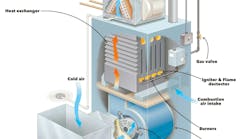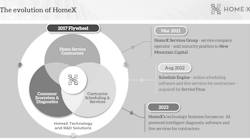We asked Louis Hobaica, president and co-owner with his brothers Mike and Paul, of Hobaica Services, to share some of his "Secrets to Business Success."
He responded gladly, with a goldmine of ideas. And why not? The company is very secure in its Phoenix, Ariz. region, and Hobaica knows a rising tide raises all boats. So please, use these ideas to transform your heating, air conditioning, refrigeration or plumbing business or to make some improvements where needed.
1. Purpose
- Create a purpose for your business, because just earning a profit is not enough.
- Know 'who you are' and how you want to be remembered by customers is imperative.
- Your company personality will be established whether you like it or not, so be purposeful about it.
- Do you have a mission statement, tag line, motto, promise, montra? If not, write it out and share it everywhere you can.
- Remember that your employees want to be part of something bigger than themselves. Therefore, it's important for them to feel that they are making a positive difference with their work and relationships.
- Your message about who you are is imperative for every one of your employees to every customer, every time.
- Are you and your team "likeable" people? At Hobaica, we are the most likable people you’ll ever meet: "You’ll Lika…Hobaica."
- Be sure to have fun, an ingredient that most companies neglect to add to the recipe.
2. Plan
- Your business is going to go somewhere, so it’s important that YOU be in charge where it’s going. Create a roadmap, a business plan for one-, five- and 10-years.
- Once your plans are in place, incorporate strategies on how you plan to get there.
- Assign these strategies to individuals who can help, with a time line for completion.
3. Leadership
- You can lead a horse to water, but you can’t make it drink.
- But it’s not smart business to do everything yourself. This will limit your growth and profitability.
- Therefore, create leaders! And always be on the lookout for new leaders of the future.
4. Culture
- This is, by far, the most important aspect of your company.
- Your team is your company’s personality. They are the greatest ambassadors of your company. They can be good ambassadors or bad ambassadors. It’s your choice.
- Your employees should always come first. Treat them as your #1 customer.
- Your treatment of employees will be reflected in how they will treat customers, so make it a great experience.
- It is very difficult to train for personality, but easy to train for skills. Therefore, hire for personality, and hire individuals that align with your culture. Then, train for skillset.
- Create regular team interaction to continue developing your team relationships. It’s critical to have fun.
- Allow your team to play outside of their comfort zone.
- Provide incentives to your team aside from their regular pay, it is important to create memorable experience
Incentives should include:
- Awards
- Recognition
- Advancement opportunities
- Ongoing training
- Vacation time
- Personal days
- Birthday off
- Paid vacations for the entire family
- Spiffs
- Gift cards
- Health insurance
- Retirement plan
5. Empower Your Team
- Allow your team members to be in charge of the customer during every experience
- Requiring them to get approval for everything they do deters from positive attitudes and productivity
- Establish and communicate expectations
- Verify activities following special events
- Provide coaching for future desired outcomes
- Accountability is key, do what you say
- Owners/managers don’t fire team members, they terminate themselves by not following clearly communicated expectations
6. Listen to Your Team
- Your team has great ideas
- However, if you don’t listen, you’ll never hear them
- An open-door policy sounds good, but does not really work, because typically, when an employee has a great idea to share, it's not a good time for you. And, as a manager, you may take time out to listen, but will typically try to determine why the idea won’t work so you can put it to rest ASAP and get back to your urgent tasks.This typical type of communication in a company results in your team members feeling unimportant, that their opinions don’t matter. They won’t share their ideas any more.
- SOLUTION: Create a process for your team to submit ideas that will allow them a fair opportunity to be heard.
- Recognize all ideas and celebrate successes.
- At Hobaica, we utilize a program…"I Got An Idea." Team members submit an idea that meet one or more of the following criteri
- It will make money.
- It will save money.
- It will save time
- All ideas are placed in the "idea parking lot," which is a large bulletin board for all to see.
- All ideas are considered and responded to.
- Individuals are recognized, and successes celebrated at company meetings.
7. Find Your Service Niche
- Fact is…people like to do business with people they like, are more committed and spend more money
- Your customers already like doing business with you…so offer them more services
- Never say no, we don’t offer that service to a customer
- Own your customer, with all of the major services they may need.
- Offer as many services that are in alignment with what you want to offer.
- For the services you choose not to offer yourself, create a host of preferred vendors that operate their business and treat their customers the same way you do.
- Sell their services directly to your customers and use your preferred vendors as your subcontractors.
- Be sure to spiff your employees for these sales.
8. The Importance of Skilled Labor
- Don’t rely on outside sources to fulfill your labor pool needs.
- Build and utilize an in-house apprenticeship program.
- Continually bring up new technical experts.
- Provide paid continuous training and certification for your entire team.
- Cross train your team members so there are as versatile as possible.
- This allows you to be more efficient by filling gaps as different services and areas of your business are not always in alignment with each other.
9. Perfecting the Customer Experience
- This is the most time sensitive important relationship to manage
- Customer expectations are much more demanding than ever before
- 24hr service, on-time & taking care of the problem at hand just are not enough. The customer relationship is key
- Get on a first name basis.
- Be likable.
- Listen to their needs.
- Communicate not just verbally and in writing, but also with technology.
- Utilize pictures.
- Videos are huge.
- Phone and in-person customer communication should all be in alignment with your entire team.
- Create scripts and examples of your expectations.
- Video demos of each type of interaction.
- Regular role playing is critical to get all on board.
- Create positive memorable experiences with your customers. The fact is, your customers will quickly forget what you said or did, but will long remember how you made them feel. Try to create customer experiences that are emotionally-based. Do the unexpected, something out of the ordinary
- Hobaica has a program, "Positive Memorable Experience" (PME) Challenge. Team members look for ways to create memorable events. They take care of an unrelated task during their service as a favor.
- Show the customer that you are looking out for them in their best interest.
- They're always doing the right thing…even when nobody is watching.
- Recognize our customers for unfortunate or happy life event with a gift sent following the visit.
- Team members are recognized for these and awarded bonuses in front of their peers.
10. Keeping Score
- You must keep score. Establish daily/weekly/monthly financial reporting in alignment with what you want to have tracked.
- You must know where you’re at, at any point in time, so that you can make needed changes and celebrate successes.









